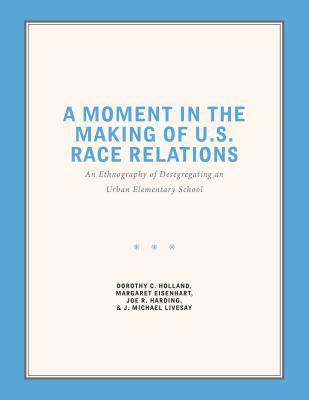
- Afhalen na 1 uur in een winkel met voorraad
- Gratis thuislevering in België vanaf € 30
- Ruim aanbod met 7 miljoen producten
- Afhalen na 1 uur in een winkel met voorraad
- Gratis thuislevering in België vanaf € 30
- Ruim aanbod met 7 miljoen producten
Zoeken
A Moment in the Making of U.S. Race Relations
Dorothy C Holland, Margaret Eisenhart, Joe R Harding, J Michael Livesay
Paperback | Engels
€ 38,45
+ 76 punten
Omschrijving
In the fall of 1975 through the spring of 1977, as Grandin, an urban, public school in North Carolina, was desegregating, anthropologists Dorothy Holland, Margaret Eisenhart, Joe Harding, and Michael Livesay carried out an ethnographic study of the fifth and sixth grade classes. Their purpose was to understand how the students, teachers, administrators, parents, and other community members dealt with the requirement to desegregate their school. Originally published in 1978, their research relied on close-up methods that highlighted the interactional, cultural, and institutional processes of making race and race relations in the school. The book used the term "social race" to emphasize that race is a process. In today's expanded terminology, persons are raced (identified as racial) in social interactions and representations through positioning and discourse. Similarly race relations are made in day-to-day processes of interaction and meaning making.
As a specific historical case, the context at Grandin cannot be generalized to contemporary educational settings. Much about public schools has changed since the 1970s. Nonetheless, forty years later, the barriers to more positive race relations are strikingly similar: fraught interactions across differences in interpersonal styles; symbolic encounters that mean different things to different groups; provocative, hurtful terminologies; a veneer of harmony that masks serious difficulties with conflict resolution; and a virtual lack of opportunity and skills for frank discussions about experiences of racism.
As a specific historical case, the context at Grandin cannot be generalized to contemporary educational settings. Much about public schools has changed since the 1970s. Nonetheless, forty years later, the barriers to more positive race relations are strikingly similar: fraught interactions across differences in interpersonal styles; symbolic encounters that mean different things to different groups; provocative, hurtful terminologies; a veneer of harmony that masks serious difficulties with conflict resolution; and a virtual lack of opportunity and skills for frank discussions about experiences of racism.
Specificaties
Betrokkenen
- Auteur(s):
- Uitgeverij:
Inhoud
- Aantal bladzijden:
- 412
- Taal:
- Engels
Eigenschappen
- Productcode (EAN):
- 9781469649436
- Verschijningsdatum:
- 1/01/1978
- Uitvoering:
- Paperback
- Formaat:
- Trade paperback (VS)
- Afmetingen:
- 216 mm x 279 mm
- Gewicht:
- 948 g

Alleen bij Standaard Boekhandel
+ 76 punten op je klantenkaart van Standaard Boekhandel
Beoordelingen
We publiceren alleen reviews die voldoen aan de voorwaarden voor reviews. Bekijk onze voorwaarden voor reviews.







